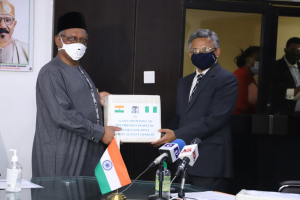India has donated essential medicines worth 50 million dollars to African countries as part of the country’s collaboration with Africa to combat the COVID-19 pandemic.
SEE ALSO: NAFDAC charges NAPPMED over agency’s rules and guidelines
The High Commissioner of India to Nigeria, Mr Abhay Thakur, disclosed this in an interview with newsmen in Abuja after he donated some items to the Federal Government.
The News Agency of Nigeria (NAN) reports that the Government of India had on Friday donated seven tonnes of consignment of essential medicines, including hydroxycholoroquine and medicine, including antibiotics to Nigeria.
The seven tonnes of consignments (586 cartoons) were received by the Minister of Health, Dr Osagie Ehanire, on behalf of the Federal Government.
The envoy said it would be very difficult to put a cost on the items donated, noting: “I will say for the whole of Africa, our donation is more than 50 million dollars.
“I am talking about the whole of Africa.”
Thakur said India would be willing to collaborate with Nigeria on production of COVID-19 vaccine, as the country had made some progress in the development of the vaccine.
He said “there are many centres in India where serious work and research is happening; there are institutions that are working across India to produce vaccine.
“One of the most promising one is developed by one of the institutions and has already gone into first phase of testing; we hope phase two will start soon.
“We hope to hear encouraging news about COVID-19 vaccine on the forthcoming India independence day, which is on Aug. 15.”
The envoy said India would continue to support Nigeria in building the capacity of its human resources as it continued to offer e-ITEC training ( Indian Technical and Economic Cooperation).
“We are offering short online webinars on COVID-19 management and research; there are about 10 programmes; we are working together and we will continue to do so.
“So far, 14 Nigerian medical professionals have benefited from online courses on COVID-19 management strategies in Africa.
“Our focus now is on capacity building but we can expand to research. I will take this message home and encourage some of our researchers to work with Nigeria on medical research.’’
He expressed optimism that the measures taken by the two countries had helped to manage the spread of COVID-19.
“In fact, I will like to mention here what President Muhammadu Buhari said in his speech in early May that India had taken strong measures and very strong lockdown measure to curb the virus.
“The exchange of experience is very important and we look to each other in combating this pandemic.
India had been enjoying longstanding, multifaceted, friendly relations and deep-rooted bilateral relations with Nigeria since it established its Diplomatic House in Lagos in November 1958, two years before Nigeria became independent on Oct. 1, 1960.




 Premier League
Premier League